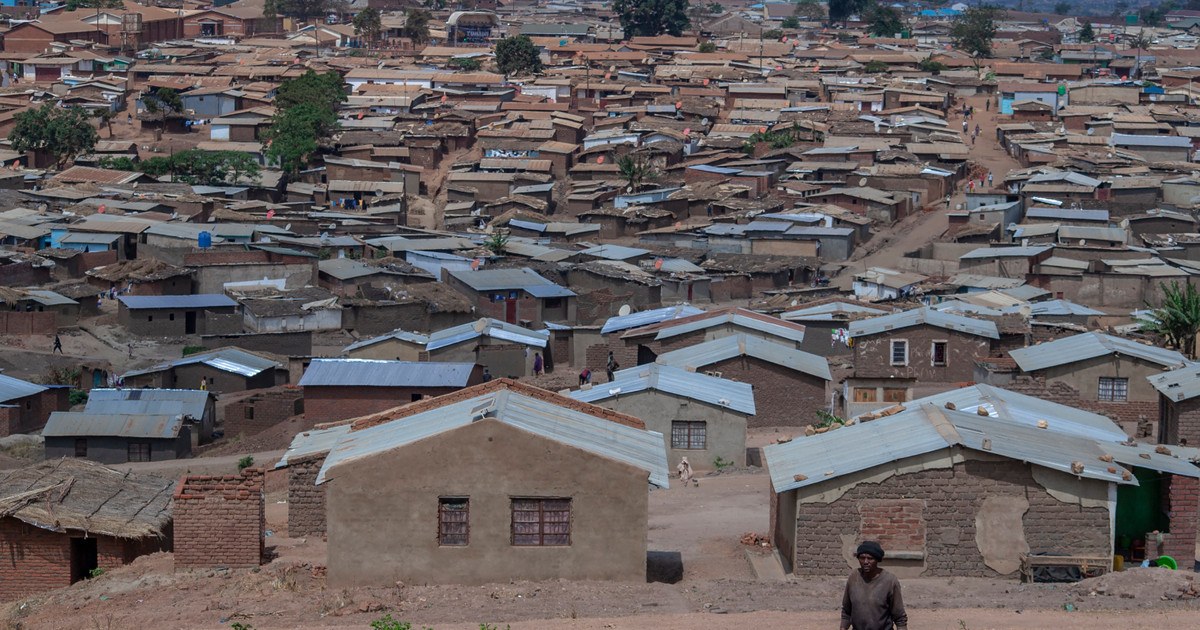Now Reading: Death, Sexual Violence and Human Trafficking: Fallout From U.S. Aid Withdrawal Hits the World’s Most Fragile Locations
-
01
Death, Sexual Violence and Human Trafficking: Fallout From U.S. Aid Withdrawal Hits the World’s Most Fragile Locations
Death, Sexual Violence and Human Trafficking: Fallout From U.S. Aid Withdrawal Hits the World’s Most Fragile Locations

ProPublica is a non-profit newsroom dedicated to investigating abuses of power. Subscribe to receive our major stories promptly upon publication.
American diplomats stationed in at least two countries have recently submitted internal reports to Washington that depict a disturbing new reality unfolding overseas: The abrupt withdrawal of foreign aid by the Trump administration is leading to the violence and turmoil that many had cautioned would ensue. State Department communications and memos acquired by ProPublica reveal that the void created after the U.S. reneged on its humanitarian commitments has destabilized some of the most fragile areas globally, exacerbating unrest in refugee camps.
These evaluations do not simply forecast the future but rather provide detailed accounts of events that have already transpired, making them among the initial reports from within the Trump administration to be made public — although experts anticipate more to follow suit. Diplomats cautioned in their communications that halting aid could erode efforts to combat terrorism.
In Malawi, a country in southeastern Africa, U.S. embassy officials informed the State Department in late April that funding cuts to the United Nations’ World Food Programme have led to a notable rise in criminal activities, sexual violence, and instances of human trafficking within a large refugee camp. The WFP, the largest humanitarian food provider globally, anticipates a 40% reduction in funding compared to the previous year and has been compelled to reduce food rations by a third in Malawi’s sprawling Dzaleka refugee camp.
In neighboring Kenya, the U.S. embassy reported that news of funding cuts to food programs in refugee camps sparked violent protests, with police resorting to gunfire during one demonstration and injuring four individuals. The embassy officials noted in a previously undisclosed cable from early May that refugees have perished at food distribution sites, including a pregnant woman who died in a stampede. Humanitarian workers expressed concerns that as vulnerable households become increasingly desperate, more people are likely to be harmed.
Eric Schwartz, a former State Department assistant secretary, and National Security Council member under Democratic administrations, expressed, “It is devastating, but it’s not surprising.” He added, “It’s all what people in the national security community have predicted.” Schwartz lamented, “I struggle for adjectives to adequately describe the horror that this administration has visited on the world. It keeps me up at night.”
In response to a detailed inquiry, a State Department spokesperson refuted the notion that unrest and violence globally can be solely attributed to America, asserting that it is unrealistic to expect the U.S. to provide for every individual on Earth or bear responsibility for supplying medication to every human being. The spokesperson emphasized that the majority of WFP programs inherited by the Trump administration, including those in Malawi and Kenya, remain active.
Nevertheless, the U.S. funds the WFP on an annual basis. For the year 2025, the Trump administration has not yet allocated any funds in either country, prompting the organization to drastically reduce food programs. In Kenya, for instance, the WFP plans to slash rations in June to a level never seen before, providing less than 600 calories per person per day, well below the standard minimum of 2,100 calories.
Since assuming office, President Donald Trump has pledged to enhance global safety and security. Concurrently, his administration, in collaboration with Elon Musk’s Department of Government Efficiency, swiftly dismantled the U.S. Agency for International Development, terminating numerous government-funded foreign aid programs deemed wasteful. This move severely crippled vital humanitarian endeavors worldwide, as over 80% of USAID’s operations were halted.
Musk, who did not respond to requests for comment, has defended DOGE’s cuts to humanitarian aid, asserting that they target fraudulent payments to organizations and do not contribute to widespread fatalities. He challenged claims to the contrary, stating, “Show us any evidence whatsoever that that is true. It’s false.”
For years, administrations of both political parties in the U.S. viewed humanitarian diplomacy, or “soft power,” as a cost-effective approach to stabilizing volatile yet strategically crucial regions and meeting basic needs of populations who might otherwise align with international adversaries. These investments, experts argue, help avert regional conflicts and wars that could entangle the U.S. Former Defense Secretary Jim Mattis remarked during his tenure at U.S. Central Command in 2013, “If you don’t fund the State Department fully, then I need to buy more ammunition.”
Food insecurity has long been intertwined with regional instability. Despite assurances from Secretary of State Marco Rubio that life-saving operations would persist amid extensive cuts to foreign aid, the Trump administration has ceased funding to the WFP for multiple countries. Nearly half of the WFP’s budget in 2024 originated from the U.S.
Records indicate that since February, U.S. officials across developing nations have issued urgent alerts, warning that the sudden cessation of aid to vulnerable populations by the Trump administration could escalate humanitarian crises and jeopardize U.S. national security interests. Diplomats in the Middle East raised concerns in one communication that discontinuing aid could empower groups like the Taliban, undermining efforts against terrorism, narcotics trafficking, and illegal immigration. They cautioned that the shift might “significantly de-stabilize the transitioning” region and “only serve to benefit ISIS’ standing,” putting U.S. troops in the area at risk.
A similar message was relayed by embassies in Africa, with the U.S. mission in Mogadishu, Somalia, expressing deep apprehension that halting USAID counter-terrorism-focused stabilization and humanitarian programs could immediately harm U.S. national security interests. The embassy in Nigeria detailed how stop-work orders had led to lapses in oversight, putting U.S. resources at risk of diversion to criminal or terrorist entities. The Kenyan government was highlighted as facing an imminent humanitarian crisis for over 730,000 refugees, with local authorities struggling to combat al-Shabaab, a major terrorist threat in the region, while ensuring security within refugee camps.
In early April, Jeremy Lewin, an attorney lacking prior government experience who oversees the State Department’s Office of Foreign Assistance and manages USAID operations, terminated WFP grants in over a dozen countries. Following public outcry, a few grants were reinstated. The State Department spokesperson clarified that the agency was responding on Lewin’s behalf.
Lauren Landis, the WFP’s Kenya country director, expressed concerns that after the rations are reduced to a quarter of the standard minimum, a malnutrition crisis is expected in Kenya. She also worries about the safety of her staff, who currently travel with police escorts, given the likelihood of increased protests and potential incursions by groups like al-Shabaab into the camps.
Landis explained that to ensure the usual food aid reaches Kenya by the year’s end, it should have already been shipped. Regrettably, this has not occurred.
In recent days, South Sudanese refugees in Ethiopia implored a visiting U.S. government delegation not to further reduce food rations, as documented in a cable detailing the visit. Aid workers at camps in North Africa anticipated exhausting funding by the end of May for a program aiding 8,600 pregnant and nursing mothers combat malnutrition.
Despite being one of the poorest nations globally, Malawi has stood as a beacon of stability in a region marked by civil wars and unrest. However, officials in Malawi cautioned their counterparts in Washington in early March that the cessation of over $300 million in annual U.S. aid to the country would greatly amplify the effects of an already deteriorating economy.
An hour’s drive from Malawi’s capital, Dzaleka, a former prison turned refugee camp, accommodates individuals fleeing conflicts in neighboring countries. Iradukunda Devota, a refugee from Burundi residing in Dzaleka for 23 years, expressed heightened tensions amid rumors of further aid cuts. Devota noted increased crime and substance abuse following earlier reductions in food assistance this year, attributing the situation to hunger-induced desperation. She remarked, “This is happening because people are hungry. They have nowhere to turn to.”
The Malawian government is contemplating sealing its borders to refugees in response to the funding shortfall and overcrowding in Dzaleka, as conveyed by the WFP’s country representative to the State Department.
Diplomats persist in warning the Trump administration of looming crises. The WFP foresees a complete suspension of food assistance in Dzaleka by July, anticipating violent protests that could embroil host communities and refugees, posing a threat to UN and WFP offices when aid supplies run out.
ProPublica intends to continue reporting on USAID, the State Department, and the ramifications of ending U.S. foreign aid. We welcome your input. You can contact reporters Brett Murphy at +1 508-523-5195 and Anna Maria Barry-Jester at +1 408-504-8131 via Signal.






